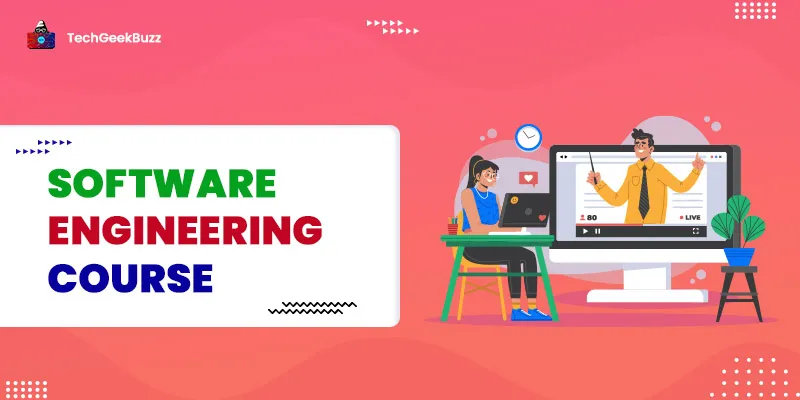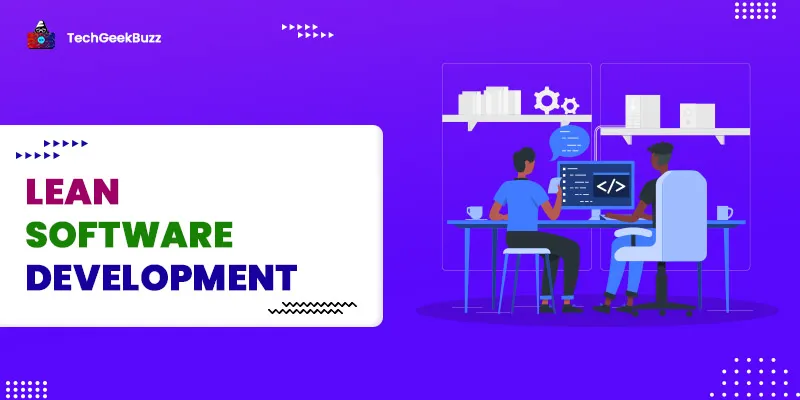Software engineering is a structured approach to software development. It entails analyzing user requirements and employing software engineering principles in designing, developing, testing, deploying, and maintaining software applications. A professional who manages the development of software products, from the concept initiation to deployment and maintenance, is a software engineer .
The software development industry is showing no signs of slowing down due to the increasing usage of software applications in this digital age. Many software development companies seek skilled engineers who can manage and supervise their entire software development process .
Software engineering is one of the most promising fields, and having your career in it is definitely rewarding. Also, the software market offers a wide range of software. If you are among the individuals wishing to kick-start your career in software engineering, we have listed some top-rated courses for you in this article that will help you in developing essential software engineer skills .
So, let us get started.
10 Best Software Engineering Courses to Take in 2023
Here is a list of top-rated software engineering courses that help you learn software engineering fundamentals and all other essential subjects required to become a software engineer .
1. Software Engineering Specialization
Platform: Coursera (The Hong Kong University of Science and Technology)
Level: Intermediate
Duration: 5 months (4 hours/week)
Instructor: Kenneth W T Leung
Certificate: Yes
Available on Coursera, Software Engineering Specialization is one of the best courses to kick-start your career as a software engineer. It helps you master techniques and methods to design, develop, test, and maintain software systems.
Programmers who wish to gain in-depth knowledge of methodologies and techniques associated with software development can opt for this course. A basic understanding of object-oriented programming is recommended but not required.
Course Highlights
This specialization consists of a series of three courses, as follows:
- Software Engineering: Modeling Software Systems using UML
This course emphasizes the first phase of SDLC, i.e., requirements gathering and analysis. It introduces you to the concept of using UML models to gather the system requirements and facilitate communication between developers and clients or users.
- Software Engineering: Implementation and Testing
This course explains SDLC’s implementation and testing phases. it will help you get acquainted with various software development processes and their strengths and weaknesses. Also, you will learn programming techniques to avoid potential bugs and errors in the source code of applications.
- Software Engineering: Software Design and Project Management
In this course, you will learn everything about project planning and the analysis or design phase of SDLC. It introduces you to design patterns and architectural patterns. Further, you will learn project planning, scheduling, and cost estimation, which are some common tasks of project managers.
Sign up here for the course.
2. Software Engineering 101: Plan and Execute Better Software
Platform: Udemy
Level: Beginner
Duration: 8 hours
Instructor: Kurt Anderson
Certificate: Yes
If you aspire to gain in-depth knowledge of the science behind software engineering, this course is perfect for you. In fact, it is ideal for anyone who wishes to have a career in software engineering. It is a standalone course and does not require any prerequisites. This course is ideal for both beginners and experienced professionals desiring to take the next step in their careers.
Course Highlights
Through this course, you will learn:
- Software development life cycle (SDLC)
- Client-server pattern
- Testing
- WRSPM Model
- Specifications and requirements of the software systems
- Master-Slave Pattern
- Verification and Validation
- Agile, Scrum, and Kanban
- Software models
- Coupling and Cohesion
At the time of writing this article, there were a total of 32K enrollees, and the course had a rating of 4.5 out of 5, averaging over 8K ratings.
Register here to take this course.
3. Programming Foundations: Algorithms
Platform: LinkedIn Learning
Level: Beginner
Duration: 1 hour 45 minutes
Instructor: Joe Marini
Certificate: Yes
As its name indicates, the Programming Foundations: Algorithms course focuses on the most powerful building blocks of programming: algorithms. An algorithm is a series of sequential instructions to solve specific problems.
In this course, the instructor, Joe Marini, has introduced and explained some of the most useful and popular algorithms in-depth. These algorithms are for searching and sorting information that works with different techniques, like recursion. In addition, Joe explains how to evaluate the performance of each algorithm and the performance implications of every algorithm.
You will find the implementation of algorithms in the Python language. However, you can implement those algorithms in any programming language. Also, each section of this course ends with a quiz chapter.
Course Highlights
The course consists of the following 6 sections:
- Overview
This section walks you through the concept of an algorithm, different algorithms in programming, and how to measure the performance of algorithms.
- Common Data Structures
You will get acquainted with different data structures, including arrays, linked lists, stacks and queues, and hash tables.
- Recursion
In this section, you will have a detailed introduction to recursion, various recursion examples, and powers and factorials.
- Sorting Data
This section covers different types of sorting algorithms, such as merge sort, insertion sort, and quicksort, and their implementation.
- Searching Data
You will learn about ordered and unordered list searches and determine whether the list is sorted or not.
- Other Algorithms
This section covers other algorithms, such as unique filtering and value counting with hash tables.
You can get started with the course here .
4. Data Structures and Software Design
Platform: edX
Level: Intermediate
Duration: 4 weeks (8–10 hours per week)
Instructor: Chris Murphy
Certificate: Yes (Verified Track)
The Data Structures and Software Design course helps you select, analyze, and apply data structures in your source code and design high-quality software that can be easy to understand and modify. It helps you to write clean and concise code in such a way that it is easy to maintain and is of high quality.
Moreover, this course helps you gain an in-depth understanding of various data structures, such as arrays, maps, lists, stacks, queues, trees, and graphs. You will learn to evaluate these data structures and understand their efficiency and behavior. This helps in choosing the best data structure for your projects.
Furthermore, this course covers various software design principles, such as abstraction, modularity, functional dependency, etc., to write high-quality code and refactoring techniques to improve the efficiency of existing code.
The course explains all the data structure concepts in Java; however, you can apply those concepts to all other programming languages.
Course Highlights
In this course, you will learn:
- An efficient way to store and retrieve data in Java programs.
- Identifying the appropriate data structure for a problem at hand.
- How to use the built-in Java data structures.
- Analyzing and validating the quality of software design in accordance with object-oriented principles.
- Transforming a set of requirements into software design.
- Writing efficient code that is easy to read, understand, and maintain.
To take this course, you should be familiar with object-oriented principles and the basics of Java programming.
5. Software Design and Architecture Specialization
Platform: Coursera
Level: Beginner
Duration: 4 months (3 hours/week)
Instructor: Kenny Wong
Certificate: Yes
The Software Design and Architecture Specialization course includes mindful strategies for creating high-quality software products. It helps you learn various design principles, patterns, and architecture and how to apply them to create reusable software applications. Also, you will be able to use visual notation to document and represent the architecture of software systems.
To take this course, you must have the ability to read and write Java code. This course assists you in developing industry-recognized skills through a plethora of practical examples and opportunities to apply concepts you learned. Additionally, you will be working on a capstone project that you will develop throughout this specialization.
Course Highlights
This specialization comprises the following four courses:
- Object-Oriented Design
After taking this course, you will be able to apply object-oriented design principles for creating modular and reusable software applications. Also, it teaches you how to represent object-oriented models in the form of Unified Modeling Language (UML) class diagrams.
- Design Pattern
This course emphasizes design patterns for developing interactive applications. It educates on how to use design patterns and how to identify the most suitable design pattern for a given application design problem. Finally, you will learn to analyze code by detecting and refactoring anti-patterns and employing model-view-controller (MVC) architectural patterns.
- Software Architecture
In this course, you will get to know the different ways of representing the architecture of software applications through UML and other visual tools. Later, it walks you through the characteristics of good software architecture, how to evaluate architecture, and ways to improve them.
- Service-Oriented Architecture
This course will help you get acquainted with service-oriented architecture in two different methods, namely Web Services (WS*) and Representational State Transfer (REST) architecture.
You can get your course by signing up here .
6. Software Development Lifecycle Specialization
Platform: Coursera (University of Minnesota)
Level: Intermediate
Duration: 4 months (4 hours/week)
Instructor: Praveen Mittal and Kevin Wendt
Certificate: Yes
Software Development Lifecycle Specialization is intended for individuals who are new to software engineering and professionals desiring to gain an in-depth understanding of software development practices. It helps you learn how to develop secure and high-quality software applications using different SDLC methodologies .
Moreover, by the end of this course, you will be equipped with knowledge of comparing, analyzing, and identifying the best SDLC methodology suitable for projects.
Course Highlights
The following are the four courses incorporated in this specialization:
- Software Development Processes and Methodologies
This course teaches you to apply software engineering principles to a given project or problem, compare traditional, lean, and agile methodologies, and come up with the best suitable methodology for a given problem.
- Agile Software Development
As its name suggests, this course will walk you through agile practices for software development. You will get to know the purpose behind each and every agile practice put in use today. Furthermore, you will learn to apply agile practices while developing software applications and uncover some typical problems you encounter in agile practices.
- Lean Software Development
This course covers various techniques of the lean methodology, like Kanban and Value Stream Mapping. It lets you learn about market and user needs by introducing you to methods like Lean Startup and Design Thinking. In the end, you will be capable of employing lean development techniques in software development.
- Engineering Practices for Building Quality Software
Through this course, you will become familiar with various processes, techniques, and practices for building high-quality software applications. This course requires you to have a basic understanding of modern programming languages, including C++, Java, JavaScript, and Python, SDLC models, and UML diagrams.
Get started with the course by enrolling here .
7. Software Design Principles
Platform: codecademy
Level: Beginner
Duration: 1 hour
Certificate: yes
If you are a newbie to software engineering, this course is a perfect guide to fundamental principles of software engineering. Through this course, you will come to know about object-oriented programming, SOLID principles, design patterns, and high-level architectures for software development. The only requirement to take this course is to have a fundamental knowledge of OOPs.
Course Highlights
The course covers the following topics:
- Introduction to Software Design
- Why Object-Oriented Programming?
- Introduction to OOP and UML
- The SOLID Principles
- Introduction to Design Patterns
- Introduction to Model View Controller (MVC)
Sign up here to take this course.
8. Java Programming and Software Engineering Fundamentals Specialization
Platform: Coursera
Level: Beginner
Duration: 5 months (4 hours/week)
Instructor: Susan H. Rodger, Robert Duvall, Owen Astrachan, and Andrew D. Hilton
Certificate:
This is an introductory course for beginners wishing to commence their careers in software engineering. The course begins with the introduction to an object-oriented language popularly employed for Android development, Java. It walks you through programming concepts, teaches you how to write code and solve complex problems, and helps to develop fundamental software engineering skills, from designing algorithms to testing and debugging software programs.
Course Highlights
This specialization has 5 different courses as follows:
- Programming Foundations with JavaScript, HTML, and CSS
This course teaches you the fundamentals of programming and the basics of web development using HTML, CSS, and JavaScript. It will help you develop a web page where other people can upload their images and apply different image filters that you develop.
- Java Programming: Solving Problems with Software
It helps you improve your programming and problem-solving expertise and how to write Java programs. Furthermore, you will be able to design your own algorithms and debug Java programs. In the end, this course will help you develop a software program that will determine the popularity of baby names in the US. The software program will analyze the values (baby names) stored in CSV files.
- Java Programming: Arrays, Lists, and Structured Data
In this course, you will get familiar with different data structures supported by Java. Using these data structures, you can develop complex software products using Java. After completing this course, you will be equipped with the skills to develop an encryption program and another program to break the encryption algorithm.
- Java Programming: Principles of Software Design
This course covers different principles of software design. It walks you through Java interfaces for developing scalable programming solutions. You will get to know in-depth about Java multiple classes to solve real-world problems. Finally, you will be able to create a program for analyzing and sorting earthquake data and develop a predictive text generator.
- Java Programming: Build a Recommendation System
Here, you will have to apply all the Java concepts you learned to build a recommendation system. Though you will have to deal with data for movies, you can apply the concepts or principles for books, restaurants, and other things.
Start your course by enrolling here .
9. SOLID Principles: Introducing Software Architecture & Design
Platform: Udemy
Level: 2 hours
Duration: Beginner
Instructor: Sujith George
Certificate: Yes
This course is for a budding coder or an experienced programmer who wishes to develop better software design and write high-quality code. It covers the core concepts of SOLID principles in-depth that help you write clean and concise code. Also, you will understand how good quality and robust code differs from bad code.
Well-crafted illustrations and real-world analogies make it easy for beginners to understand the concepts. There are hands-on sessions for revamping and re-designing existing code by applying the SOLID principles.
Course Highlights
The course consists of 28 lectures spread across 7 sections as follows:
- Introduction
- Single Responsibility Principle
- Open Closed Principle
- Liskov Substitution Principle
- Interface Segregation Principle
- Dependency Inversion Principle
- Summary
Enroll here for the course.
10. Software Engineering: Introduction
Platform: edX
Level: Advanced
Duration: 6 weeks (8–10 hours per week)
Instructor: Reid Holmes
Certificate: Yes
This course helps learners to understand how to apply software engineering principles to develop a fully-functional software system. It lets you know how software development teams design, develop, and test multi-version software systems.
Furthermore, this course explores software engineering principles, agile development, REST, asynchronous programming, refactoring, information security, software specification, and many other concepts.
Course Highlights
By the end of this course, you will learn:
- How to employ an agile approach to develop a non-trivial software system.
- Various techniques and procedures for specifying functional and non-functional aspects of a software system.
- Methods for designing and testing software systems.
- The importance of refactoring while developing a high-quality software application.
To get started with the course, sign up here .
Conclusion
Here ends our list of the best software engineering courses. From the above list, you can choose any course that best fits your learning requirements, level of knowledge, and, more importantly, your budget. These online courses are self-paced, allowing you to learn on your own schedule. Make sure to pick the best course and kick0start your first step to becoming a software engineer.
Good Luck!
People are also reading:
- Software Engineer vs Software Developer
- Software Engineering vs Computer Science
- Data Structure and Algorithm Courses
- Computer Science Courses
- Best Data Science Courses
- Best Programming Courses
- Web Development Courses
- Software Developer Salary
- How to Become a Software Developer
- How To Become a Web Developer




Leave a Comment on this Post